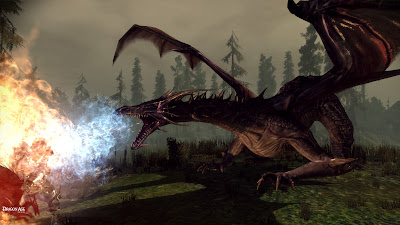
The sad truth is I was reluctant to buy Dragon Age after reading a less than glowing review in Edge magazine that claimed the game to have a shoddy, clichéd and poorly scripted story, and ultimately branded it a five out of ten. Fortunately word-of-mouth won the day and I was persuaded by many people that, on the contrary, this was a finely crafted, meticulously scripted game – and guess what? It is.
Now I’m no fan of clichéd run-of-the-mill fantasy so suffice to say I was approaching the game with a sceptical eye when the first thing I was asked to do was to craft a character based on a choice of three rather familiar races and classes (Dwarf, Elf, Human – yawn). Still I reserved judgement and took my human rogue into battle, where it very quickly became clear that the game only uses tradition as a convenient springboard for a new idea or merely to have a little fun. Take the first quest in the human story: you and your faithful Malbari war hound have to clear a few rats from the castle pantry – a familiar set up that leads your partner to announce ‘this sounds like the start of a bad fantasy adventure’. After some crashes and bangs you emerge from the larder dripping in gore to calmly tell the incredulous elderly cook that ‘the problem has been taken care of’. A nice moment of understatement and a good example of the ribald humour that runs throughout. Later, for instance, you can stay at a brothel and for company are given the choice between ‘some girls’, ‘some men’, or ‘surprise me’. If you choose the latter the game cuts to your character standing in the bedroom the next morning in their underwear with two pigs desperately trying not to make eye-contact.
There are also some nice deviations from tradition in the detailed world that the game constructs via hundreds of codex entries. Here elves are former slaves living in ghettoes in human cities, rather than noble lords of the forest, whilst magic is outlawed except for a small circle of mages that the chantry (Ferelden’s rather corrupt religious entity) keeps on a short leash. But the most impressive thing here is the attention to characterisation, which is at times staggering. At any point your frequently antagonistic party members may break into witty banter, trading verbal blows in the down time from fighting. ‘Stop tripping me up dwarf!’ shouts the samurai-esque Qunari warrior Sten to your foul mouthed dwarven berserker Oghren ‘if you were more substantial perhaps I wouldn’t step on you.’ Unable to come up with a response Oghren resorts to responding ‘Your mother!’ The game bristles with tongue-in-cheek, witty banter (and the mind boggles as to how much must have been recorded for every possible party combination) all finely presented with some decent voice acting, and certainly not the ‘staid and limp performances’ Edge accuses. It is this playful tongue-in-cheek quality, poking fun at the conventions of the genre without ever being arrogant enough to do away with them entirely, that makes Dragon Age such a charming game in spite of its admittedly slightly laggy, dull graphics and initially over-familiar setting.




No comments:
Post a Comment